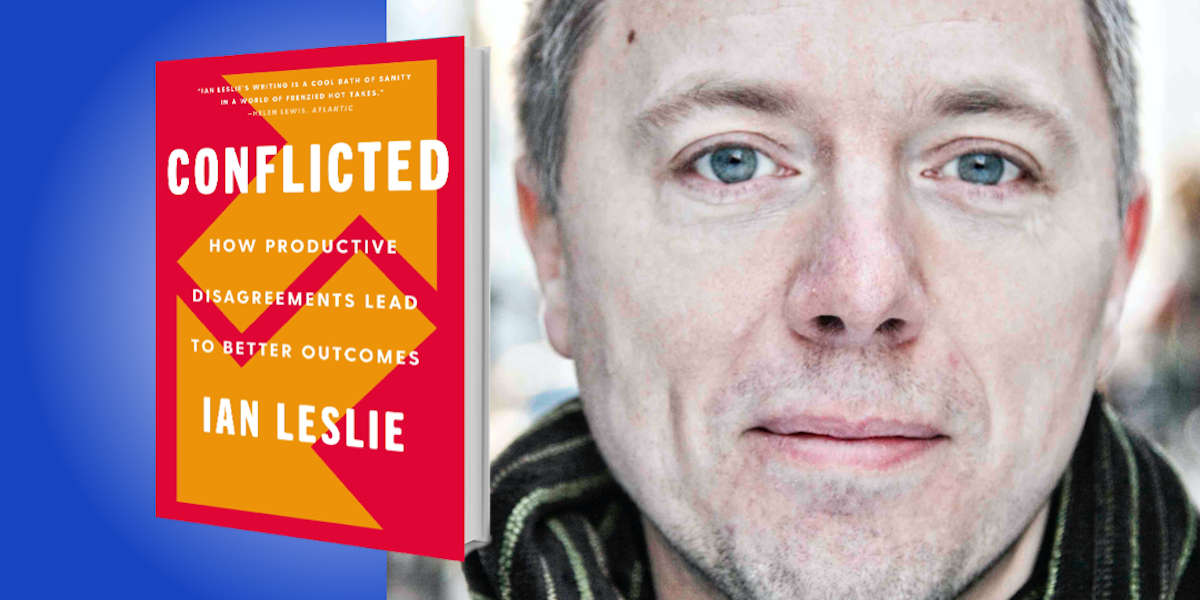Ian Leslie is a regular contributor to the New Statesman, the Economist/1843, the Guardian, and the Financial Times. He writes about science and human behavior, and has been writing books that analyze a fundamental human trait. His first book focused on lying, his next tackled curiosity, and now he takes a deep dive into disagreement.
Below, Ian shares 5 key insights from his new book, Conflicted: How Productive Disagreements Lead to Better Outcomes (available now from Amazon). Listen to the audio version—read by Ian himself—in the Next Big Idea App.
1. The Disagreement Machine.
In the early years of the internet, it was a popular theory that the more that people were able to communicate with others, the more friendly and understanding they would become. In 2021, that vision seems naïve. The internet is connecting people, but it isn’t necessarily creating fellow feeling. At its worst, it resembles a vast machine for the production of hostile disagreement.
Tempting as it is to blame social media for our ills, that would miss the significance of a more profound shift in human behavior that has been decades, even centuries, in the making. The cultural anthropologist Edward T. Hall introduced a distinction between two types of communication culture: high context and low context.
In a high-context communication culture, like China’s, relatively little is said explicitly. Most of the message is implied by the context—tradition and social norms determine a lot of what’s said and who says it. Communication is oblique, subtle, and economical. Direct disagreement tends to be avoided.
In a low-context culture like America, communication tends to explicit and direct. You don’t necessarily need to understand the context—who is speaking, in what situation—to understand. In low–context cultures there’s more conflict, because people are explaining what they believe all the time and finding out how much they disagree with one another.
“The internet is connecting people, but it isn’t necessarily creating fellow feeling.”
The internet is a low-context culture, and today, most of us, wherever we are in the world, are living increasingly low-context lives. We live in cities full of people from different backgrounds, we do business with strangers, and we converse over smartphones. We can’t rely on tradition to communicate. We have to explicitly say what we want or believe, and that risks argument. The thing is, neither evolution nor culture has trained us for this. Our ancestors were high-context—they lived in settlements and tribes with shared traditions and chains of command. Now, everyone expects their voice to be heard, and technology gives everyone a podium. In this raucous, irreverent, gloriously diverse world we’ve built for ourselves, everyone is talking back to everyone else. We live in a society more prone to disagreement than ever in history—and nobody has prepared for it.
2. Conflict unifies.
If we avoid conflict, we miss out on the immense benefits born of productive disagreement. Disagreement makes us more intelligent, as teams and as individuals, and helps us reach better decisions. It makes us more creative, innovative, and, perhaps most surprisingly, it brings us closer. Why is conflict beneficial for relationships? We can start to answer that by looking at the science of romantic relationships.
In the lab, psychologists closely observe couples discussing points of contention in their relationship. Then they monitor the progress of those couples over the months and years to come. It turns out that the couples who are always amicable tend to be less happy and less satisfied in their relationship than more confrontational couples. Couples who are relatively quick to argue are more likely to stay together and make headway in solving their differences.
Why is that? A psychologist who specializes in marital conflict told me that “Conflict is information.” It is often only when your partner loses their temper that you understand what is deeply important to them. Sometimes it’s only in an emotional disagreement that you find out how much the other cares about you. In an argument, you learn about what the other really thinks and really feels. Conflict offers an insight into the other’s heart, revealing truths—and truthful relationships tend to be stronger.
“Couples who are always amicable tend to be less happy and less satisfied in their relationship than more confrontational couples.”
3. First connect, so that disagreement generates insights—not pure heat.
Major Sherwood Moran, of the U.S. Marines, raised a family in Tokyo before World War II. When the Japanese attacked Pearl Harbor in 1941, he was living in Boston. Realizing his fluency in Japanese might be helpful to the war effort, he enlisted. Moran soon became known as an extraordinarily effective interrogator of Japanese soldiers. The Japanese were fanatically, suicidally committed to their cause, and deeply hostile to Americans. Yet somehow, Moran always found a way to open them up.
Unlike some of his fellow interrogators, Moran never engaged in bullying or abuse. He believed that if the prisoner was forced to be defensive, that merely reinforced his determination not to speak. Instead, the interrogator should achieve “rapport” with the prisoner. Even the most implacable prisoner has a story he wants to tell, and the surest way to create conditions in which he feels willing and able to tell it, Moran says, is to show that you are interested in him as a human being.
Today, most expert interrogators agree that establishing a rapport with the suspect is the key to getting them to talk. Good interrogators don’t demand anything. They don’t even ask for information until they’ve established a human connection. Instead of saying “tell me what you know,” they say, “tell me your story.” And then they listen.
We can apply Moran’s wisdom to disagreements. One of the mistakes we make most often is getting to the point of difference too quickly, before we have made a connection. The key to a productive disagreement is to get the other to lower their shield—and you don’t do that by pushing them. So before getting to the tough part, show the other person you’ve listened to them. Tell them where you agree, what you’ve learnt from them. Put them and their troubles centerstage, not your problems. Have the disagreement, but first, connect.
4. Create the adversary you want.
In 1993, Nelson Mandela, then South Africa’s leader-in-waiting, faced a clear and present danger. Three years before, he had been released from prison, marking the fall of apartheid. He was now the unofficial head of a government preparing the country for its first fully democratic election, in which the country’s Black majority would have a vote for the first time.
“Before getting to the tough part, show the other person you’ve listened to them.”
But not all white South Africans were reconciled to this idea. 15,000 men attended a rally near Johannesburg, waving Nazi flags and toting guns. At the climax of the proceedings, everyone turned to Constand Viljoen, a former general in the South African army, renowned as a ruthless enforcer of white supremacy. When he rose to speak, he incited his followers to violence in defense of a separatist white state. Reports circulated back to Mandela that Viljoen was at the helm of a hundred-thousand-strong militia. Mandela considered having Viljoen jailed for treason, but doing so risked making Viljoen a martyr, just as Mandela’s own arrest had done many years before. Besides, Mandela’s aim was to build a democracy in which all races felt included. So, he invited Viljoen to tea.
Viljoen arrived at Mandela’s house, accompanied by three other former generals. To his surprise, not a servant but Mandela himself greeted them at the door. With a wide smile, he suggested that he and Viljoen talk privately before the negotiations began. Whilst alone, Mandela began to considerately serve Viljoen tea, making sure to learn exactly how Viljoen preferred it as he kindly made his guest a cup. Shortly after this meeting, Viljoen ordered the disarmament of his militia without a shot being fired. He became a member of South Africa’s democratic government, and a devoted admirer of President Mandela. Later, he recalled being served tea by Mandela as a pivotal moment.
In a tense conversation, each person strives to put on a good face—to project a desired impression of themselves as authoritative and impressive. That effort is called “facework.” One of the most powerful disagreement skills we can learn is the ability to confirm the face that the other person wishes to project, to build them up, to put in facework on their behalf. When the other person feels their desired face is being recognized, they’re going to be a lot easier to engage in a productive argument.
Mandela was a brilliant, intuitive psychologist. He knew that Viljoen was a proud man who feared humiliation above all. So, he found a way of showing him that he respected him—that he was even prepared to serve him. By putting in facework on Viljoen’s behalf, he created the adversary he wanted.
“We’re not so good at fostering vigorous debate and disagreement, despite the fact that it’s the fastest route to smart decisions and new ideas.”
5. Create a culture of positive argument.
We’re so familiar with the fact that the Wright brothers invented the airplane that we overlook the miraculous nature of their achievement. Wilbur and Orville Wright were not scientists or qualified engineers; they ran a bike store in Dayton, Ohio. That they were able to solve one of the greatest engineering puzzles in history owes a lot to an extraordinary talent for productive disagreement.
Dayton locals were used to the sound of raised voices spilling out from the room over the bicycle repair shop. When a family friend expressed discomfort at the way the brothers argued, Wilbur, the elder brother, explained why arguing was so important to them:
“No truth is without some mixture of error, and no error so false but that it possesses no element of truth…Honest argument is merely a process of mutually picking the beams and motes out of each other’s eyes so both can see clearly…”
The Wright brothers didn’t just argue—they took delight in verbal combat and threw themselves into every battle. “Orv’s a good scrapper,” said Wilbur, fondly.
In the modern workplace, we put a great emphasis on getting along, but we’re not so good at fostering vigorous debate and disagreement, despite the fact that it’s the fastest route to smart decisions and new ideas. So how do you create a culture of positive argument?
The Wrights offer us a few hints. First, they set a strong norm of direct disagreement—since they practiced it all the time, they didn’t find it emotionally stressful; they enjoyed it. They didn’t interpret contradiction as disrespect but as a sign of respect. Second, they listened as hard as they argued—they were always genuinely interested in what the other had to say in response to whatever they said. And third, they trusted each other to care about more than just winning an argument. The Wrights put every disagreement in the service of a higher goal.
To listen to the audio version read by Ian Leslie, download the Next Big Idea App today:































